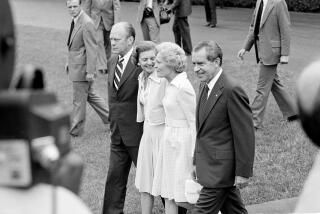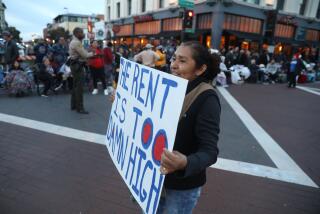Bush the arrogant
As the Bush administration attempts to stabilize the nation’s economy, we are witness to the final chapter of a period of perverse and dishonest leadership that has used its own crises to justify the expansion of its own power. This was a president who came to office on promises of modesty -- who championed a “humble nation,” scorned nation building and promised a more limited role for government in the lives of its citizens. Then he presided over a six-year attempt to tear down and rebuild the nations of Afghanistan and Iraq, and now has embarked on the most profound expansion of the federal government’s role in the private economy since the Depression.
In both cases, the pattern is the same. Ineptitude led to crisis; crisis then became the argument for the radical expansion of executive power. The administration insisted that it exercise its new authority with a minimum of scrutiny by Congress, the courts or the public.
In the so-called war on terror, that has meant the abdication of our most basic American principles. We have forfeited privacy and honor -- the administration has monitored phones and e-mails without warrants and has secreted prisoners in foreign lands, arguing that they deserved none of our protections even while in our custody. As a nation, we have stooped to torture (while debating the meaning of the word) and refused to recognize one of our most basic Anglo-American notions, the principle of habeas corpus (thankfully, the Supreme Court, seven of whose members are Republicans, drew the line at that abomination). We have held prisoners in detention without trial, without charge, without end. In so doing, we have antagonized the world and debased America’s moral authority to lead.
The same administration responsible for these catastrophes has over the last month nationalized the largest source of funding for mortgages and the largest insurance company on the planet. And it proposed to intervene even more dramatically in the nation’s economy by having the Treasury Department -- with no court, congressional or public oversight -- relieve financial institutions of the troubled mortgages and related securities that have locked up the lending system.
There is no doubt about the depth and range of the crisis that provokes these calls for government action. The gyrations of the stock market have been dismaying, and the threat to the country’s financial institutions -- and everyone who borrows from or invests in them -- is real. Still, the audacity of this administration demanding expanded powers and curtailed accountability is a wonder to behold. The bitter irony is that this crisis warrants dramatic intervention, but President Bush’s record makes him difficult to trust even when he’s right.
These troubles are about more than a president who is unfaithful to his word. Bush has transformed the balance of power in our government. We are seeing the erection of an imperial presidency, immune from oversight when it fights terrorists and when it rescues banks.
Politically, these developments raise two questions: Which candidate to succeed Bush benefits most by the events of recent weeks? And which candidate, if either, would have the strength to roll back these expansions of presidential power if elected?
To the first question, the answer seems to be Barack Obama, though only modestly. Obama’s poll numbers have inched up in recent days as voters have taken stock of a frighteningly complex economic meltdown and been left to wonder what to think of John McCain’s abrupt, halting responses -- as McCain saw it, the “fundamentals” of the economy were sound one moment, at risk the next.
Questions about McCain’s judgment in recent days have only been deepened by the performances of Alaska Gov. Sarah Palin. She has struggled in her rare public appearances, and her selection risks appearing all the more reckless and cynical when held against the seriousness of this financial crisis. Even McCain’s campaign “suspension” seemed like gamesmanship. He said he was rushing to Washington, but took his time, and the talks derailed soon after he arrived. He proclaimed that the situation was so dire he would not return to the stump until an agreement was reached, then did precisely what he said he wouldn’t. It was not an impressive week for the Straight Talk Express.
Still, Obama has hardly run away with this issue, and the economic news exposes his weaknesses as well. He is, after all, untested by executive crisis and a freshman senator of limited achievement in government. Voters may well blanch at his relative inexperience, given the gravity of these times. Indeed, it is telling that in a week when his opponent flailed, Obama made scant headway in the polls.
On the matter of which candidate could be trusted to roll back the excessive powers that Bush has aggregated, Obama is vague and McCain is exasperating. McCain has properly condemned the U.S. detention facility at Guantanamo Bay and said he would close it, but when the court granted detainees there the rights of habeas corpus, McCain denounced the ruling as “one of the worst decisions in the history of this country.” He condemned torture, but then, with the campaign underway, voted against legislation to limit the CIA’s use of coercive interrogation. Those oscillations do not reassure.
Obama, meanwhile, is more consistent and encouraging but offers few specifics. He pledges to close Guantanamo, restore habeas corpus and end the invasions of privacy undertaken in the name of fighting terrorism. Those are welcome positions and provide some hope that he would roll back Bush’s excesses. But while he pledges allegiance to the separation of powers, Obama has said little about how to honor that pledge. Rare is the politician who willingly cedes authority, and we have not heard enough from Obama to be convinced he’s that rare person.
These are not abstractions. They are the legacy of this grim epoch, one that should be equally offensive to conservatives and liberals. George Bush promised humility and delivered arrogance. The next president must not.
More to Read
A cure for the common opinion
Get thought-provoking perspectives with our weekly newsletter.
You may occasionally receive promotional content from the Los Angeles Times.






